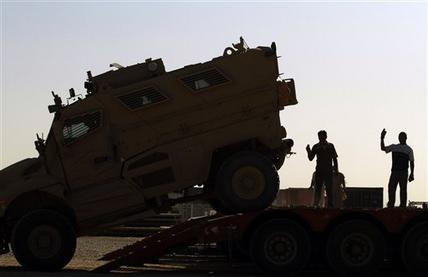, GAZA CITY ,Gaza Strip A healthy man in blockaded Gaza faked cancer, hoping the deadly disease would be his ticket out of the territory that has become an open-air prison for its 1.4 million residents.
GAZA CITY ,Gaza Strip A healthy man in blockaded Gaza faked cancer, hoping the deadly disease would be his ticket out of the territory that has become an open-air prison for its 1.4 million residents.
His ploy failed, but several thousand others succeeded in fleeing this shabby sliver of land this year using bribes and fake medical reports, a sign of Gazans’ desperation over growing poverty and misery under the strict border closure enforced by Egypt and Israel since Hamas militants overran Gaza in June 2007.
The blockade has few loopholes. Israel allows passage to top business people and a limited number of Gazans seeking treatment for serious illnesses. Egypt sporadically opens its border for university students and those with residency abroad.
Everyone else is stuck, even as Palestinian polls suggest nearly half the population would like to leave if they could. Deepening the Gazans’ sense of imprisonment, they must now also obtain permission from the Hamas government before attempting to leave, further complicating an obstacle-ridden path to freedom.
Those trying to bribe their way out usually approach middlemen who put them in touch with local doctors, Palestinian health officials or Egyptian bureaucrats and military officials.
Akram Ghneim, 31, an unemployed father of six living off food handouts, told The Associated Press he promised $260 to a Palestinian middleman, who obtained for him a bogus medical report saying he had cancer. Ghneim said he hoped he’d get a rare spot on the list of Gaza patients with life-threatening illnesses who are allowed to enter Israel for treatment.
Once in Israel, he planned to disappear and work illegally. But Israeli intelligence officials, who review applications, rejected him last summer, saying his cancer report was forged.
“This is what the blockade does,” said Ran Yaron, of the Israeli group Physicians for Human Rights, which helps bring Gazans into Israel for treatment by lobbing Israeli defense officials.
“Most are frustrated and devastated people.”
Yaron said fakers are a minority, but clog up the system for real patients who have to go through longer checks as a result.
Of more than 7,000 Gazans who crossed into Israel this year to seek medical treatment, some 500 haven’t returned, said Col. Moshe Levi, an Israeli defense official.
Some stay in Israel, while others move to the West Bank, a territory controlled by Israel but partly administered by Palestinians loyal to Fatah, bitter rivals of Hamas.
One Fatah loyalist, a healthy 30-year-old woman, said she was desperate to leave Gaza after being harassed by Hamas officials.
She bribed a Gaza doctor with $100 to certify she had “whatever cancer could only be treated in Israel.” The doctor then paid off a physician serving on a Palestinian committee that certifies medical reports for Israeli military officials, the woman said. She eventually succeed in reaching the West Bank and spoke on condition of anonymity for fear of being sent back to Gaza by the Israeli authorities.
Israeli intelligence officials investigate Gazans applying to enter Israel to ensure they are not militants and to check whether medical certificates are genuine, but tend to rely on the Palestinian committee to confirm that the patient is actually sick.
The head of the Palestinian committee, Bassam Badri, denied members accept bribes. Omar Masri of the Palestinian Health Ministry in the West Bank said the issue was “too stupid for a response.”
But Palestinians who have successfully used bogus transfers said some health officials accept payments, anything from $100 to $500. They spoke on condition of anonymity because of the illicit system.
Others pay bribes to get out through the Rafah border crossing into Egypt, said a senior Hamas official, who spoke on condition of anonymity because he did not want to alienate Egyptian authorities.
Payments range from $400 to $5,000, according to Rafah residents familiar with the system, known among Gazans as “Egyptian coordination.”
An Egyptian security official at the border denied Egyptian officers take bribes to allow crossings. He said that three months ago, two Palestinian officials posted on the Egyptian side were removed on suspicion of taking bribes. The official spoke on condition of anonymity because he was not authorized to talk to the press.
Depending on the sum, the middleman’s talents and luck, bribe-paying Gazans can sometimes leave immediately through the crossing, with Egyptian officials stamping them through, even when it’s closed, Rafah residents said. Otherwise, bribe-payers wait for one of the official border openings by Egypt, usually lasting for around three days every month or two.
About 2,000 Gazans get through each time the border opens. Only half are on the official list and the rest are handled directly by the Egyptian authorities, said Ehab Ghussein, the Interior Ministry spokesman in Gaza.
Thousands more have applied to leave but don’t make the list, he said.
Numerous tunnels run under the Gaza-Egypt borders in a thriving smuggling trade bringing goods into the territory. But few Gazans use them to sneak into Egypt, because once on the other side they would have no official status and be more vulnerable to Egyptian police.
But even paying bribes isn’t a guaranteed exit strategy.
Hazem Riyashi, 27, says he paid a middleman $1,000 in July to cross through Egypt, hoping to reach the Gulf emirate of Dubai, where his family lives. But the middleman disappeared and has not returned his calls. Riyashi hasn’t given up, and is looking for someone else to pay off.
“I think everybody should leave Gaza,” he said. “Even the air smells cleaner abroad.”



